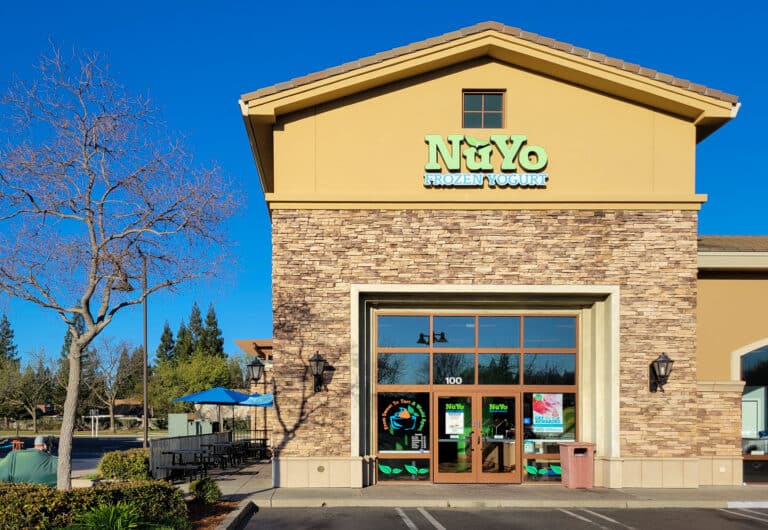Hurts Donut Company Franchise FDD, Profits & Costs (2025)

Founded in 2013 by entrepreneurs Tim and Kas Clegg, Hurts Donut Company reinvents the classic donut with a creative flair, offering an extensive selection of innovative flavors and toppings.
Based in Springfield, Missouri, Hurts Donut sets itself apart by its adventurous and unconventional donut varieties, often referred to as “the rebel of all donuts.”
Each flavor is crafted as a unique expression of appreciation for its customers, challenging traditional donut conventions with eclectic toppings and daring flavors.
Initial Investment
How much does it cost to start a Hurts Donut Company franchise? It costs on average between $504,000 – $825,000 to start a Hurts Donut Company franchised business.
This includes costs for construction, equipment, inventory, and initial operating expenses. The exact amount depends on various factors, including the type of restaurant you choose, the location, and whether the franchisee chooses to lease or purchase the property.
| Type of Expenditure | Amount |
|---|---|
| Franchise Fee | $35,000 – $35,000 |
| Rent & Security Deposit | $10,000 – $15,000 |
| Initial Training Fee | $10,000 – $10,000 |
| Leasehold Improvements | $200,000 – $350,000 |
| Architectural/Engineering | $6,000 – $15,000 |
| Opening Inventory and Food Ingredients | $40,000 – $70,000 |
| Equipment and Smallwares | $125,000 – $175,000 |
| Furniture | $9,000 – $12,000 |
| Computer Hardware, Software, and POS System | $4,000 – $11,000 |
| A/V Equipment | $1,000 – $5,000 |
| Vehicle and Wrap | $10,000 – $15,000 |
| Signage/Art Package | $15,000 – $40,000 |
| Insurance | $7,000 – $12,000 |
| Travel and Living Expenses for Initial Training | $2,000 – $5,000 |
| Retail Merchandise | $25,000 – $35,000 |
| Additional Funds – 3 months | $5,000 – $20,000 |
| Total | $504,000 – $825,000 |
Hurts Donut Company Franchise Disclosure Document
Frequently Asked Questions
How many Hurts Donut Company locations are there?
As of the most recent data, Hurts Donut Company operates a total of 16 locations. Of these, 15 are franchise-owned, and 1 are company-owned. This reflects the company’s ongoing expansion within the United States.
What is the total investment required to open a Hurts Donut Company franchise?
The total investment required to open a Hurts Donut Company franchise ranges from $504,000 to $825,000.
What are the ongoing fees for a Hurts Donut Company franchise?
The ongoing fees for a Hurts Donut Company franchise include a 5% royalty fee on gross sales and a 2% marketing fee, also based on gross sales. These fees cover the use of the brand and contribute to both local and national marketing efforts.
Who owns Hurts Donut Company?
Hurts Donut Company is owned by Tim and Kas Clegg, who founded the business in 2013. The couple, based in Springfield, Missouri, launched the company with a unique and creative approach to donuts, which has contributed to the brand’s growth and popularity across the United States.
Disclaimer
Disclaimer: This content has been made for informational and educational purposes only. SharpSheets is an independent educational resource and is not affiliated with, endorsed by, or representing any franchisor mentioned on this website. Where noted, figures are taken from the franchisor’s Franchise Disclosure Document (FDD). In some cases, we may provide independent calculations or estimates based on publicly available information. We do not make any representation or warranties with respect to the accuracy, applicability, fitness, or completeness of the information presented in the article. You should not construe any such information or other material as legal, tax, investment, financial, or other professional advice. Nothing contained in this article constitutes a solicitation, recommendation, endorsement, advertisement, or offer to buy or sell any franchises, securities, or other financial instruments in this or in any other jurisdiction in which such solicitation or offer would be unlawful under the franchise and/or securities laws of such jurisdiction.
All content in this article is information of a general nature and does not address the detailed circumstances of any particular individual or entity. Nothing in the article constitutes professional and/or financial and/or legal advice, nor does any information in the article constitute a comprehensive or complete statement of the matters discussed or the law relating thereto. You alone assume the sole responsibility of evaluating the merits and risks associated with the use of any information or other content in this article before making any decisions based on such information or other content.




